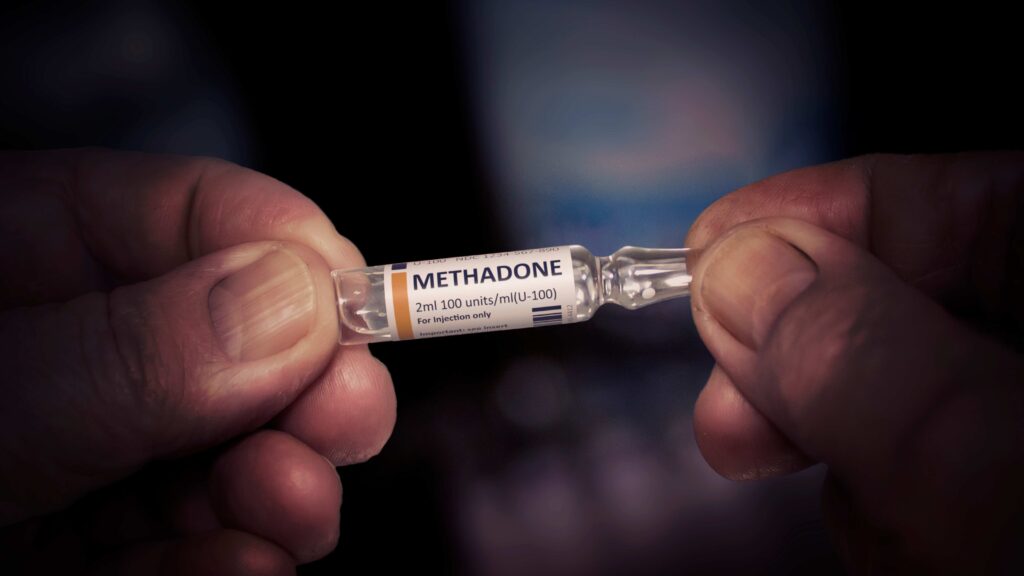Table of Contents
Can I drive while on methadone treatment?
For many in recovery from opioid misuse, methadone is a lifeline—a crucial part of their treatment that helps manage cravings and withdrawal symptoms. However, like any medication, it comes with certain precautions, especially when it comes to activities that require alertness. That’s why individuals need extra precautions when taking methadone and driving.
But why? Well, methadone can affect your ability to drive safely, even if you feel “fine.” It’s essential to understand how methadone works in your body and the potential risks associated with driving while taking it. This consideration isn’t just a matter of personal safety; state laws can be strict about driving under the influence of methadone or similar medications.
In this blog by GateHouse Treatment, we’ll explore what methadone is, how clinicians use it for substance use treatment, and whether it’s safe to drive while taking it. We’ll also cover the legal implications and what steps you can take to protect yourself and others on the road.
What Is Methadone, and How Is It Used in Treatment?

Methadone is an FDA-approved long-acting opioid agonist used for more than 40 years as a treatment for individuals diagnosed with opioid substance abuse by helping to reduce cravings and withdrawal symptoms. Methadone works by interacting with the same opioid receptors in the brain that substances like heroin or morphine do, but in a controlled and medically supervised way. By stabilizing these receptors, methadone allows individuals to recover without the intense highs and lows associated with other opioids.
In a treatment setting, licensed medical staff administrate methadone as part of a comprehensive Medication-Assisted Treatment (MAT) program, which, in many cases, clinicians suggest including MAT with counseling and behavioral therapies. The staff monitors and adjusts dosage carefully to ensure the individual receives enough to prevent withdrawal and cravings.
However, because methadone is still an opioid, it can cause drowsiness, dizziness, and impaired cognitive function—particularly when starting treatment or adjusting doses. These side effects are crucial to consider when performing activities that require full attention, such as driving.
Methadone and Driving: Is it Safe?
The answer depends on several factors, including your dosage and how long you’ve been on the medication. Methadone can affect everyone differently. Some people who are on stable, long-term doses may not experience significant side effects that impact their ability to drive safely. However, others—especially those new to the treatment or who have recently had their dose adjusted—might feel drowsy, lightheaded, or experience slower reaction times. These side effects can interfere with alertness and coordination, making driving risky.
This medication can cause a range of side effects, some of which directly affect your ability to stay focused and respond while taking methadone and driving. Common side and serious effects, according to SAMHSA, include:
- Dizziness
- Drowsiness
- Lightheadedness
- Nasua
- Impaired cognitive function
- Slow breathing
- Restlessness
- Chest pain
- Hallucinations
So, before driving, it’s essential to have a thorough discussion with your healthcare provider. They can help assess whether it’s safe for you to get behind the wheel, particularly in the first weeks of treatment or after any dose adjustments. If you ever notice new or worsening side effects, it’s critical to stop driving and seek medical advice to avoid dangerous situations.
DUI Laws and Methadone
Driving under the influence (DUI) or driving while intoxicated (DWI) laws don’t just apply to alcohol—they extend to any substance that impairs your ability to operate a vehicle, including Schedule II controlled substances such as methadone. State laws vary, but many take a hard stance on driving while on methadone or any other medication that affects your motor skills or cognitive functions.
For instance, when it comes to methadone and driving, in New Hampshire, it’s illegal to drive while impaired by any substance, including prescription medications like methadone. According to Title XXI, Chapter 265-A of New Hampshire law, individuals can not operate a vehicle if drugs impair their ability to drive—whether they are controlled substances, prescription medications, or even over-the-counter drugs.

In this case, it means that if law enforcement suspects methadone is affecting your ability to drive, you could face DWI charges, even if you are following a prescribed treatment plan.
Penalties for a DWI in NH involving any controlled substance are just as severe as those for alcohol or illegal substances. They can include fines, loss of your driver’s license, and even jail time. In some cases, simply having methadone in your system could be enough for legal consequences if it’s believed to impair your driving ability.
To stay safe, always know how methadone affects you personally, and be aware of your state DUI laws. If you’re ever uncertain about your ability to drive safely, it’s best to avoid getting behind the wheel.
Things to Keep in Mind While Taking Methadone
If you’re taking methadone, there are several vital things to keep in mind to ensure both your safety and the safety of others:
1. Monitor Your Reaction to the Medication: Pay attention to how methadone affects you, especially when you’re first starting or changing doses. If you feel tired, dizzy, or less alert than usual, it’s best to avoid driving or engaging in any activities that require full attention.
2. Talk to Your Healthcare Provider: Always consult with your healthcare provider about whether it’s safe for you to drive while on methadone. They can provide guidance based on your specific treatment plan and health condition.
3. Know Your State’s DUI Laws: Be familiar with your state’s regulations regarding methadone and driving. This knowledge can help you avoid legal trouble and make informed decisions about when it’s safe to get behind the wheel.
Check here for state DUI information.
4. Err on the Side of Caution: If you ever feel unsure about your ability to drive safely, it’s better to be cautious. Avoid driving until you’re confident that methadone isn’t affecting your motor skills or judgment.
5. Plan Ahead: If you rely on methadone as part of your treatment, consider making alternative transportation arrangements, especially in the early stages of your recovery. Ridesharing services, public transportation, or relying on friends and family for rides can reduce the pressure to drive before you’re ready.
Staying Safe While on the Road to Recovery with GateHouse Treatment
Methadone plays a critical role in helping individuals recover from opioid addiction, but it’s vital to recognize its potential impact on activities like driving. By staying informed and cautious, you can prioritize both your recovery and safety. If you or a loved one are currently in methadone treatment and have concerns about driving or managing daily responsibilities, it’s important to discuss these issues with your treatment team.
At GateHouse Treatment, we understand that recovery is a multi-faceted journey that requires careful planning and support. That is why we offer different levels of care and a variety of approaches and programs to address substance use dependence based on your needs, experience, and personal circumstances. Our options include MAT, partial hospitalization, outpatient programs, and more.
If you need help with how to balance treatment with daily life or even how to start, our team is here to help you navigate those challenges. Call us at (855) 448-3588 or schedule a free consultation today, or visit our center in Nashua, NH.
Recovery is about more than just managing dependence—it’s about rebuilding your life safely and healthily, one step at a time.
- How a Partial Hospitalization Program Supports Addiction Recovery - March 19, 2025
- Exercise for Addiction Recovery: A Power Way for Healing and Balance - March 7, 2025
- Alcohol Poisoning: How to Recognize and Prevent It - February 26, 2025




